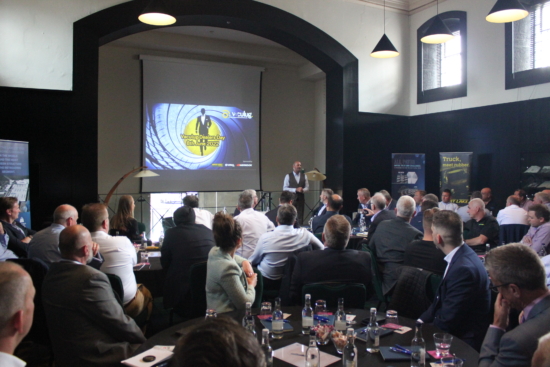Massive scope for growth: Vaculug introduces refreshed team plus re-focused fleet, retread strategies
 Customers and suppliers from across the UK (and beyond) joined Vaculug’s owners, management and completely revamped sales and marketing team for a partner event in Oxford in June (Photo: Chris Anthony; Tyre Industry Publications Ltd)
Customers and suppliers from across the UK (and beyond) joined Vaculug’s owners, management and completely revamped sales and marketing team for a partner event in Oxford in June (Photo: Chris Anthony; Tyre Industry Publications Ltd)
New commercial director Phil West addressed the transformation of Vaculug’s sales and marketing team when he said: “Not many of us have been here greater than 2.5 years.” The completely overhauled team structure features a revitalised operations team, which according to West means: “Vaculug has never had such a strong and large team supporting sales.”
The massively overhauled team brings with it a host of business upgrades, including: specialised pricing; dedicated business excellence and processing; new initiatives with the company’s VMS fleet management system; enhanced marketing and PR – and a specialist OTR team. Overall, the modifications are designed to make Vaculug more dealer and engagement focused.
‘Speed is the new currency’
Much can be said about the perfect storm of input pricing and logistical pressures currently facing the market. Some of this is to do with pandemic-related fallout. And some is to do with subsequent macro-economic issues.
According to Vaculug’s data, truck tyre demand was down 10.5 per cent in first and second quarter of 2020. This year (2022) demand is increasing, but not yet back to previous levels.
During the same period container prices have exploded, rising 136 per cent in 2021 compared with 2020. 2022’s prices are now up 500 per cent compared with the same benchmark. At the same time, natural rubber was up 40 per cent in 2021 (compared with 2020) as a result of high levels of latex glove demand. In addition, wholesale energy prices are up 300 per cent – and that’s before the 2023 price increase. And we haven’t even mentioned the war in the Ukraine and its impact on carbon black prices.
Vaculug executive chairman, Harjeeve Kandhari shared details of Vaculug’s corporate responsibility and charitable activities as well as the businesses ongoing sustainability emphasis (Photo: Chris Anthony; Tyre Industry Publications Ltd)
In short, it is an unprecedented time for price increases. Despite that – as well as the fact that most other tyre manufacturers have put up their tyre prices by 20 per cent across the board – Vaculug had not raised prices yet as of May 2022. However, in all likelihood, price increases are unavoidable. The questions are only: when, how much, and how are they implemented?
At the same time, the Chinese tyre import situation remains quite unpredictable – something that has historically had a marked impact on both the UK new truck tyre and retreaded truck tyre markets. At the time of going to press, European anti-truck tyre tariffs had been annulled, but the decision not to implement that annulment in the UK had just been revealed. The subsequent European-level decision to reopen the anti-dumping investigation hadn’t yet taken place. And still, none of that takes into account the impact of simultaneous Chinese tyre production pressures (many factories have had production time squeezed down to three days a week for significant parts of the first half) and news of significant expansion plans by certain key players. Therefore, the best estimate is to assume that there will be a consistent flow of 350,000 such Chinese-produced truck tyres into the UK for the time being.
The difference this time round is that domestic Chinese regulatory issues paired with logistics headaches will make Chinese truck tyres proportionally more expensive and therefore less competitive against retreads – especially premium quality retreads. And that, in turn, gives top-end retreads the opportunity to keep the customers won since the implementation of tariffs. Indeed, leading players are taking the opportunity to go on the offensive and are aiming to convert hauliers that previously bought cheap Chinese truck tyres to retread customers on the basis of quality, performance, competitiveness and – increasingly – sustainability arguments.
In the meantime, the fact that Vaculug remains independent paired with significant investments in manufacturing and tyre stock as well as staff and strategy developments give the business “massive scope for growth”, according to company representatives.




Comments